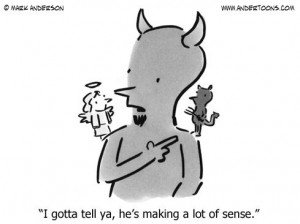Drop Anchors Carefully
 A few years ago at a Sioux Falls, ID supermarket, the owners experimented with marketing labels next to cans of soup. Some days the label said “10% off regular price, limit 10 per customer,” and on other days it said “10% off regular price, no limit per customer.” Shoppers purchased twice as many on the days with limitations. The sense of scarcity set an anchoring effect, and the number 10 set a mental anchor of the amount of cans they should buy. So, those presented with the limited availability felt a mental urge to buy more.
A few years ago at a Sioux Falls, ID supermarket, the owners experimented with marketing labels next to cans of soup. Some days the label said “10% off regular price, limit 10 per customer,” and on other days it said “10% off regular price, no limit per customer.” Shoppers purchased twice as many on the days with limitations. The sense of scarcity set an anchoring effect, and the number 10 set a mental anchor of the amount of cans they should buy. So, those presented with the limited availability felt a mental urge to buy more.
Similarly, if I ask you, “Is the oldest dog in the world older or younger than 60 years?” and then I ask you, “How old is the oldest dog?”, your answer will be higher than if I just ask you “How old is the oldest dog in the world?” You know instinctively that a 60 year old dog is completely nuts, but it will still have a psychological priming effect and sway your guess upwards. Significantly upwards it turns out. Your dog-age guess will be over a decade above your guess without the suggestion of a 60-year old dog.
Mental anchors are everywhere, and quite effectively used in negotiations. The above example is from Daniel Kahnemann’s new book Thinking Fast and Slow. In his chapter on the anchoring effect, he also points out that we are much more susceptible to psychological anchors during times of stress and anxiety. If we are in a stressful state and someone suggests a point of direction, or an idea to consider, we are much more likely to accept and build on that idea, instead of patiently and thoughtfully questioning it. In another Kahnemann-type example, if you are nervous and I ask even a ridiculous question like, “Is your arm getting numb?” You are far more likely to believe your arm might actually be getting numb instead of reject such a nutty suggestion.
Consider this next time you speak your mind: In times of stress with mounting deadlines, you can more easily make your case but you do so at the expense of allowing the thoughtful contribution of the team. And then sacrifice the voice of the community who might have a more powerful collective idea than you. Create a space to allow considered contribution. You will almost always create a stronger result.
[Cool cartoon from Andertoons – check them out]


